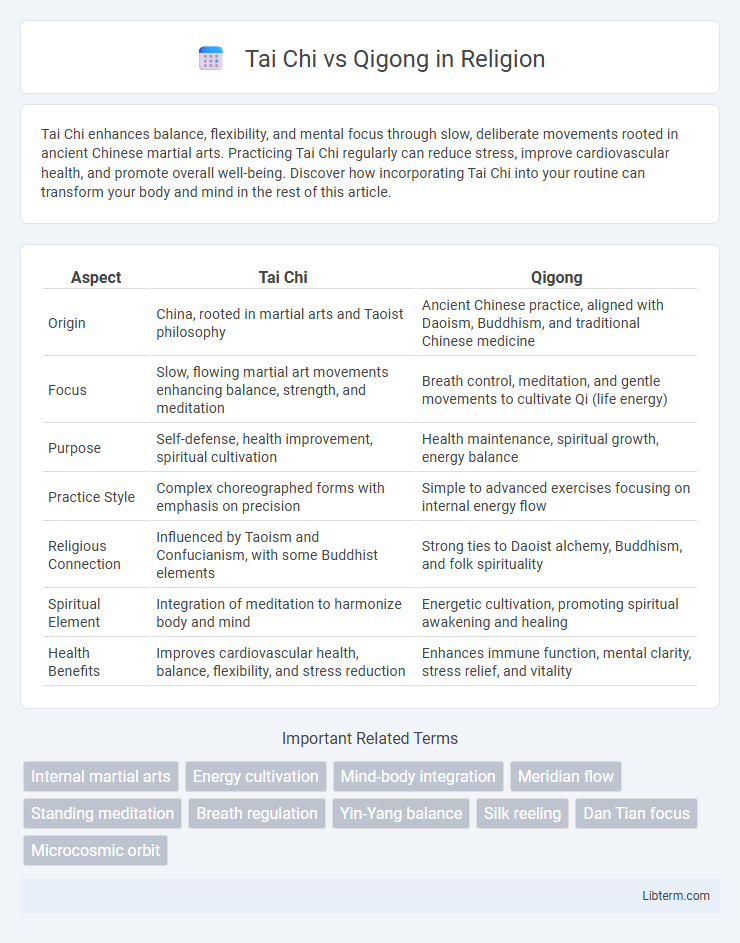Tai Chi enhances balance, flexibility, and mental focus through slow, deliberate movements rooted in ancient Chinese martial arts. Practicing Tai Chi regularly can reduce stress, improve cardiovascular health, and promote overall well-being. Discover how incorporating Tai Chi into your routine can transform your body and mind in the rest of this article.
Table of Comparison
| Aspect | Tai Chi | Qigong |
|---|---|---|
| Origin | China, rooted in martial arts and Taoist philosophy | Ancient Chinese practice, aligned with Daoism, Buddhism, and traditional Chinese medicine |
| Focus | Slow, flowing martial art movements enhancing balance, strength, and meditation | Breath control, meditation, and gentle movements to cultivate Qi (life energy) |
| Purpose | Self-defense, health improvement, spiritual cultivation | Health maintenance, spiritual growth, energy balance |
| Practice Style | Complex choreographed forms with emphasis on precision | Simple to advanced exercises focusing on internal energy flow |
| Religious Connection | Influenced by Taoism and Confucianism, with some Buddhist elements | Strong ties to Daoist alchemy, Buddhism, and folk spirituality |
| Spiritual Element | Integration of meditation to harmonize body and mind | Energetic cultivation, promoting spiritual awakening and healing |
| Health Benefits | Improves cardiovascular health, balance, flexibility, and stress reduction | Enhances immune function, mental clarity, stress relief, and vitality |
Understanding Tai Chi: Origins and Philosophy
Tai Chi, originating from ancient Chinese martial arts, combines slow, deliberate movements with deep breathing to cultivate balance, flexibility, and inner harmony. Rooted in Taoist philosophy, it emphasizes the flow of Qi (vital energy) and the concept of Yin and Yang, promoting physical and mental well-being. Unlike Qigong, which broadly focuses on energy cultivation, Tai Chi integrates martial techniques with meditative practice for holistic health.
Qigong Explained: History and Fundamentals
Qigong, an ancient Chinese practice dating back over 4,000 years, combines controlled breathing, slow movements, and meditation to cultivate and balance vital energy known as "Qi." Rooted in traditional Chinese medicine, Taoist philosophy, and martial arts, Qigong emphasizes the harmonious flow of energy through the body's meridians to promote physical health and mental clarity. As a foundational practice for health maintenance and spiritual development, Qigong serves both medical and meditative purposes distinct from the more martial and physical forms of Tai Chi.
Core Principles: Tai Chi vs Qigong
Tai Chi emphasizes continuous, flowing movements that integrate balance, posture, and breath control to cultivate internal energy (Qi). Qigong centers on coordinated breathing, meditation, and static or dynamic postures to enhance Qi circulation and promote physical and mental well-being. Both practices share the core principle of Qi cultivation but differ in movement complexity and focus on martial application versus health maintenance.
Movement Styles: Flow and Structure Compared
Tai Chi features slow, continuous, and circular movements that emphasize fluid transitions and balance, promoting internal energy flow and mindfulness. Qigong incorporates both dynamic and static postures, focusing on breath control and energy cultivation with simpler, repetitive motions. The structured forms of Tai Chi demand precise sequences, while Qigong allows more flexibility in movement variations based on individual energy needs.
Health Benefits of Tai Chi
Tai Chi offers significant health benefits, including improved cardiovascular health, enhanced balance, and reduced stress levels through its slow, deliberate movements and deep breathing techniques. Studies show that regular Tai Chi practice can increase muscle strength, flexibility, and joint mobility, while also boosting cognitive function and reducing symptoms of anxiety and depression. This mind-body exercise is particularly effective for older adults, aiding fall prevention and promoting overall physical and mental well-being.
Health Benefits of Qigong
Qigong enhances health by promoting energy flow (Qi) and improving balance, flexibility, and mental clarity through gentle, rhythmic movements and controlled breathing techniques. Regular practice supports cardiovascular health, reduces stress hormones, and boosts immune function, making it effective for chronic disease management and overall vitality. Unlike Tai Chi's martial arts focus, Qigong emphasizes healing and energy cultivation, benefiting respiratory function and reducing symptoms of anxiety and depression.
Meditation and Breathwork: Differences and Similarities
Tai Chi and Qigong both emphasize meditation and breathwork, fostering relaxation and mental focus through slow, deliberate movements and controlled breathing techniques. Tai Chi integrates these elements into complex, flowing martial arts sequences that enhance physical balance and coordination, while Qigong often uses simpler, repetitive exercises centered on cultivating internal energy (Qi) and deep, diaphragmatic breathing. Both practices promote mindfulness and stress reduction, but Tai Chi is more movement-oriented, whereas Qigong prioritizes static postures and meditative breath control.
Choosing the Right Practice for Your Needs
Tai Chi emphasizes slow, flowing movements that enhance balance, flexibility, and cardiovascular health, making it ideal for individuals seeking a gentle yet dynamic exercise. Qigong focuses on breath control, meditation, and static postures to cultivate internal energy (Qi) and reduce stress, appealing to those needing relaxation or spiritual growth. Selecting between Tai Chi and Qigong depends on goals such as physical fitness, mental clarity, or energy management, ensuring a personalized approach to mind-body wellness.
Tai Chi and Qigong for Stress Reduction
Tai Chi and Qigong both promote stress reduction through mindful movement and controlled breathing, with Tai Chi offering a more structured series of slow, flowing postures that improve balance and mental focus. Qigong emphasizes gentle exercises and meditation to circulate energy (Qi) throughout the body, enhancing relaxation and reducing anxiety. Research indicates regular practice of Tai Chi can lower cortisol levels and improve sleep quality, while Qigong is effective in calming the nervous system and reducing symptoms of chronic stress.
Integrating Both Practices for Optimal Wellbeing
Integrating Tai Chi and Qigong enhances overall wellbeing by combining Tai Chi's dynamic, flowing movements with Qigong's focused breath control and internal energy cultivation. This fusion promotes physical strength, flexibility, mental clarity, and stress reduction more effectively than practicing either art alone. Regular practice of both disciplines supports balancing qi (vital energy), improving cardiovascular health, and fostering holistic mind-body harmony.
Tai Chi Infographic

 libterm.com
libterm.com